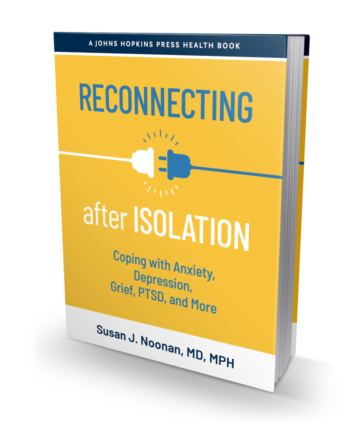I happened to be in a conversation with two different people recently, both of whom were distressed and discouraged to learn that mood disorders like depression or bipolar disorder are generally considered relapsing and remitting conditions. This means that episodes come and go over time in a pattern that is unique to each person. They were distraught to learn that their mood episode could come back, even though they were getting the “best” treatment.
These two people each described themselves as having a very good life, with “access” to many things that others of us only dream of, such as an excellent education, good jobs, financial security, comfortable homes, an interesting life full of stimulating activities and people. They were surprised by their depression – it was not on their radar, not something they had paid attention to. What! Not me! Their error in thinking was that “having resources and access will prevent this biologically based illness, or prevent it from recurring” – it will not. Depression does not discriminate. It hits all ages and social groups. It is believed to arise from the perfect storm of your genes interacting with events in your environment.
Their second error in thinking was that you can go out and “buy” good health, mental or physical – you cannot. You can engage in treatment with mental health treatment professionals who are the best match for you. And then it takes a lot of work to deal with any diagnosis. The end result may not be what these two people preferred.
How did these two individuals end up thinking this way? I suspect that along the way in life they did not develop very strong resilience skills. Resilience is the ability to bounce back from adversity, from the difficult things in life including an episode of depression or bipolar disorder. It’s a set of skills that build inner confidence in yourself, where you confront your fears; maintain an optimistic, realistic outlook; rely on your inner core values; seek and accept social support; imitate resilient role models; challenge your mind; attend to your physical, mental and emotional health and well-being; and look for meaning, purpose and opportunity in the face of adversity.
Resilience can’t happen if you’re not challenged in life, if you don’t stretch yourself to reach out and try new things and take risks. Can’t happen unless you’ve had something adverse in your life for you to learn from, whether it be a situation or your health. They perhaps were “protected” from this by families who protected and provided for them, or perhaps they had very fortunate life circumstances and a smooth life course. I’d guess that this is not very common. Most of us have challenges in life, and experience adversity.
Can you imagine my response to them? In addition to their working on building resilience, I explained that their best effort would be to obtain professional treatment early on, manage your illness with a solid relapse prevention plan and stick to the Basics of Mental Health (take meds, follow sleep hygiene guidelines, eat a balanced healthy diet, exercise daily, have a structure and routine to your day, avoid isolation and keep up with your social contacts). These will make a difference in keeping your illness at bay, with episodes kept to a mild degree and fewer of them.
It sounds like a lot of work, and they confessed a fear of becoming a “professional patient” with days full of thinking about your illness and going to appointments. But that is not the case. If you make these things a natural part of your everyday life, incorporated into your daily routine and schedule, then it becomes a habit that you don’t need to dwell upon. Then you’ll have time to focus on other things you enjoy. It won’t seem as if you are missing out on life, or depriving yourself. You can thrive!
Stay well!
A version of this article was previously posted on Psychology Today.

